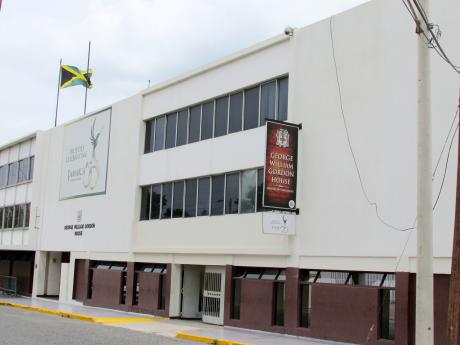Several buildings housing key government entities still not accessible to persons with disabilities
More than eight months after Parliament passed the Disabilities Act, which makes provisions to safeguard and enhance the welfare of persons with disabilities across Jamaica, a majority of government buildings are yet to be retrofitted to increase access to persons with disabilities.
Under the act, the owner or the agent of an existing private premises "shall, if requested by a person with a disability, make or cause to be made such alterations to that premises or a part thereof, in order to ensure that as far as reasonably practicable the premises is accessible to and usable by a person with a disability".
However, the act also allows the owner of the premises not to make the adjustments if "it is structurally impracticable to meet the requirements ... or to effect such alteration would constitute a disproportionate or undue burden", and it appears the State is taking full advantage of this clause.
A Sunday Gleaner probe of several randomly selected government offices and buildings in the Corporate Area found that most lacked basic infrastructure to facilitate members of the disabled community, such as designated parking spots, access ramps, and handrails.
For a leading member of the local disabled community, Senate President Floyd Morris, who championed the passage of the legislation, the fact that the Government has made little attempt to improve the accessibility of buildings which house key state entities is heartbreaking.
"I tell you, it is extremely disheartening, and I would go even further and say it is nauseating," Morris told The Sunday Gleaner.
"To know that we have advocated for the legislation for years and we finally got the legislation last year and we haven't seen the efforts by these ministries to implement the legislation is very disappointing," he added.
OUT OF REACH
Morris said while the law had established the Jamaica Council for Persons With Disabilities as a statutory agency, it is the Ministry of Labour and Social Security that is charged with the responsibility to ensure that the provisions of the act are enforced.
"That is why it is extremely important for you to speak to the Ministry of Labour and Social Security because they have to lead the charge in this regard," said Morris.
Efforts to contact Social Security Minister Derrick Kellier were unsuccessful last week.
The Sunday Gleaner was not alone in this regard as Sarah Newland-Martin of the National Advisory Council for Persons With Disabilities also complained of a lack of success in her attempts to contact state officials regarding the implementation of the terms of the act.
"Whenever I call there, I hear persons are in a meeting, or they just stepped out, and I really want to know what is going on because, like you, I have not seen anything happening," said Newland-Martin.
She argued that while a cornerstone of the act was to improve access to public or commercial premises for members of the disabled community, the failure of the State to do so is not only an oversight but presents a clear and present danger to disabled persons who use these government offices.
"Anywhere that you have ramps, they must have rails, because someone with a wheelchair can fall over. Someone who is blind can fall over as well because they don't know it's not a step. For someone like myself with a double prosthesis, the incline of these service ramps is difficult to manoeuvre, so the rails act as protection for the person from falling over and injuring themselves," said Newland-Martin.
NOT ALL BAD
She gave credit to private and commercial premises such as the Sovereign Centre, where she says she has seen a constructive effort to address the accessibility needs of disabled persons since the passage of the act.
"The malls and shopping centres have made an effort to facilitate the disabled. They have parking spaces that are right beside the ramps, so if you are getting out of the wheelchairs, you just go right up and into the stores and these are fitted with railings."
Newland-Martin said the difficulties which she and other persons with disabilities experience at some government buildings have forced her to oftentimes ask others for assistance which, while necessary, deprives her of her independence.
"It is helpful, but it is not good enough because we want to be independent. We don't want people to be sorry for us. I have heard persons use language such as, 'Oh, I have to help this crippled lady', and they may mean well, but that language is offensive," said Newland-Martin.
"But due to the steepness of some of the (service) ramps at those buildings, I have had to swallow my pride and ask someone, 'Can I borrow your hand?' because I could not get down ramps which are so steep and have no rails."
Newland-Martin argued that the lack of action on the part of state agencies, despite the passage of the act, signals that there is still a need for greater attention to the plight of members of the disabled community.
"They never know when they will have to use a wheelchair and experience what it is like to find it difficult to get into a building, but as they say, 'who feels it knows it'."





